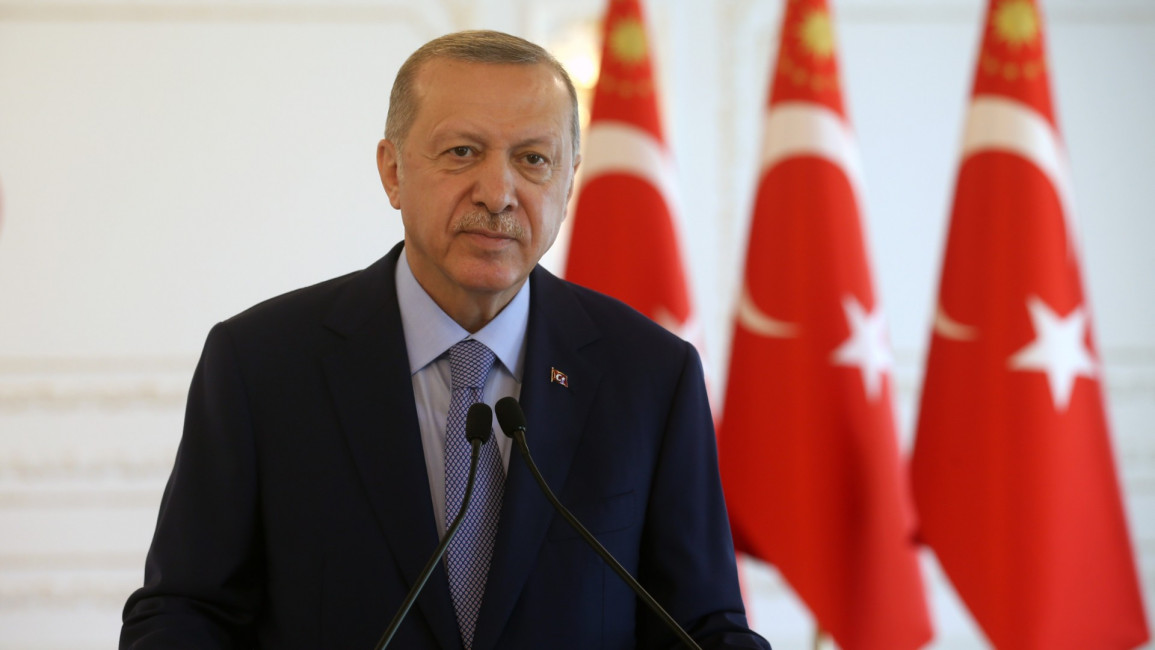Hagia Sophia resurrection paves way for 'Al-Aqsa liberation', Erdogan says
President Recep Tayyip Erdogan made the comments in an Arabic statement after "resurrecting Hagia Sophia" on Friday, in a move that has divided opinions worldwide.
"The resurrection of Hagia Sophia is the footsteps of the will of Muslims across the world to come…the resurrection of Hagia Sophia is the reignition of the fire of hope of Muslims and all oppressed, wrong, downtrodden and exploited," the Turkish Presidency website said in a Turkish statement.
However, the Arabic translation of the same statement suggests Turkey's Hagia Sophia move is part of the "return of freedom to Al-Aqsa" from Israel.
A magnet for tourists worldwide, the Hagia Sophia was first constructed as a cathedral in the Christian Byzantine Empire but was converted into a mosque after the Ottoman conquest of Constantinople in 1453.
Twitter Post
|
On Friday, Erdogan, who has chipped away at the Muslim-majority country's secularism, announced Muslim prayers on July 24 at the UNESCO World Heritage site, transforming the iconic landmark from a museum to a mosque after numerous attempts over the years.
Erdogan's announcement came after the cancellation of a decision under modern Turkey's secularising founder Mustafa Kemal Ataturk to preserve the church-turned-mosque as a museum.
The decision drew widespread criticism from world powers, including the US, who described disappointment, grief and dismay over the move.
"We are disappointed by the decision by the government of Turkey to change the status of the Hagia Sophia," State Department spokeswoman Morgan Ortagus said.
"We understand the Turkish government remains committed to maintaining access to the Hagia Sophia for all visitors, and look forward to hearing its plans for continued stewardship of the Hagia Sophia to ensure it remains accessible without impediment for all," she said.
‘Let the chains break’
Hagia Sophia has been a museum since 1935 and open to believers of all faiths.
Transforming it from a mosque was a key reform under the new republic born out of the ashes of the Ottoman Empire.
The landmark ruling will inflame tensions not just with the West and its historic foe Greece but also Russia, with which Erdogan has forged an increasingly close partnership in recent years.
The UN's cultural agency UNESCO earlier Friday warned Turkey against converting Hagia Sophia into a mosque, urging dialogue before any decision was taken.
Ahead of the court decision, Justice Minister Abdulhamit Gul shared a picture of Hagia Sophia on his official Twitter account, with a message: "Have a good Friday."
Finance Minister Berat Albayrak, Erdogan's son-in-law, tweeted that Hagia Sophia would be reopened to Muslim worship "sooner or later", referring to a quote from Turkish poet Necip Fazil Kisakurek.
Read more: Hagia Sophia conversion plan comes at testing times for Turkey's Erdogan
The Council of State had on July 2 debated a case brought by a Turkish group - the Association for the Protection of Historic Monuments and the Environment, which demanded Hagia Sophia be reopened for Muslim prayers.
Since 2005, there have been several attempts to change the building's status. In 2018, the Constitutional Court rejected one application.
Despite occasional protests outside the site by Islamic groups, often shouting, "Let the chains break and open Hagia Sophia" for Muslim prayers, authorities had until now kept the building as a museum.
Follow us on Facebook, Twitter and Instagram to stay connected



